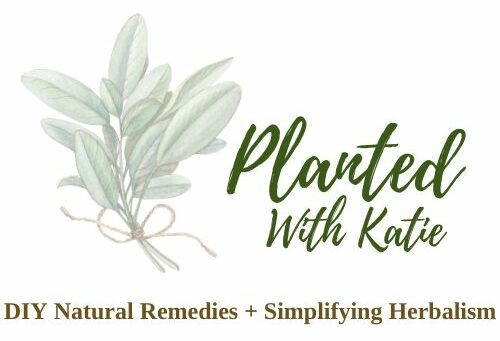12 Types of Herbal Tea For Hormonal Balance
In today's fast-paced world, hormonal imbalances are becoming increasingly common, leading to mood swings, irregular periods, and a host of other issues. But here's the good news: you can take control of your hormone levels naturally through the power of Herbal Tea for Hormonal Balance.
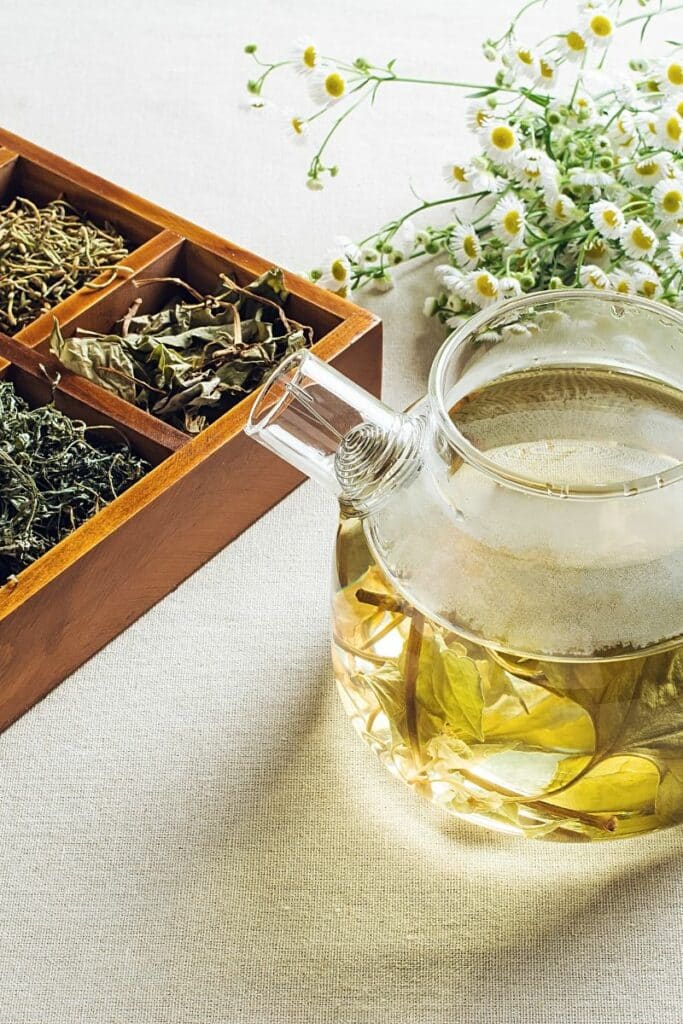
Disclaimer: This is not medical advice. Information and statements shown here are for educational and informational purposes only and are not to replace the advice of your healthcare professional.
This post may include affiliate links. Please refer to our disclaimer for full disclosure.
In this blog post, we're going to explore the top herbal teas that can help you achieve hormonal balance, improve your overall reproductive health, and promote a sense of well-being. Let's dive right in!
Herbal Teas and Hormonal Balance
Herbal teas are key players in achieving hormonal balance, harnessing nature's healing properties to support our well-being. These teas contain special compounds called adaptogens, which help our bodies handle stress and maintain stability.
By working with our endocrine system, herbs like chaste berry and dong quai help regulate hormone levels naturally, addressing issues like menstrual discomfort or menopause symptoms. Unlike synthetic options, herbal teas offer gentle relief without harsh side effects, providing a holistic approach to health. Embracing these natural remedies empowers us to nurture our bodies and achieve optimal balance for overall wellness.
Top 12 Herbs For Hormone Balance
In this section, we'll uncover nature's remedies that can naturally regulate your hormones. Let's explore these 12 powerful plants and their potential for your well-being.
1. Red Clover Tea for Menopausal Symptoms
Let's talk about Red Clover Tea and how it can help with menopausal symptoms. I also love this menopause tea with a syneristic blend of herbs for menopause. If you're experiencing hot flashes and night sweats, this herbal remedy might just be your new best friend.
Red Clover Tea has been known to ease these uncomfortable symptoms, offering relief when you need it most. But what's the science behind its effectiveness?
Well, red clover contains compounds called phytoestrogens, which are like plant-based versions of estrogen. When you drink Red Clover Tea, these phytoestrogens can help balance out hormone levels in your body, which may reduce the intensity and frequency of hot flashes and night sweats.
My top Organic Red Clover Source.
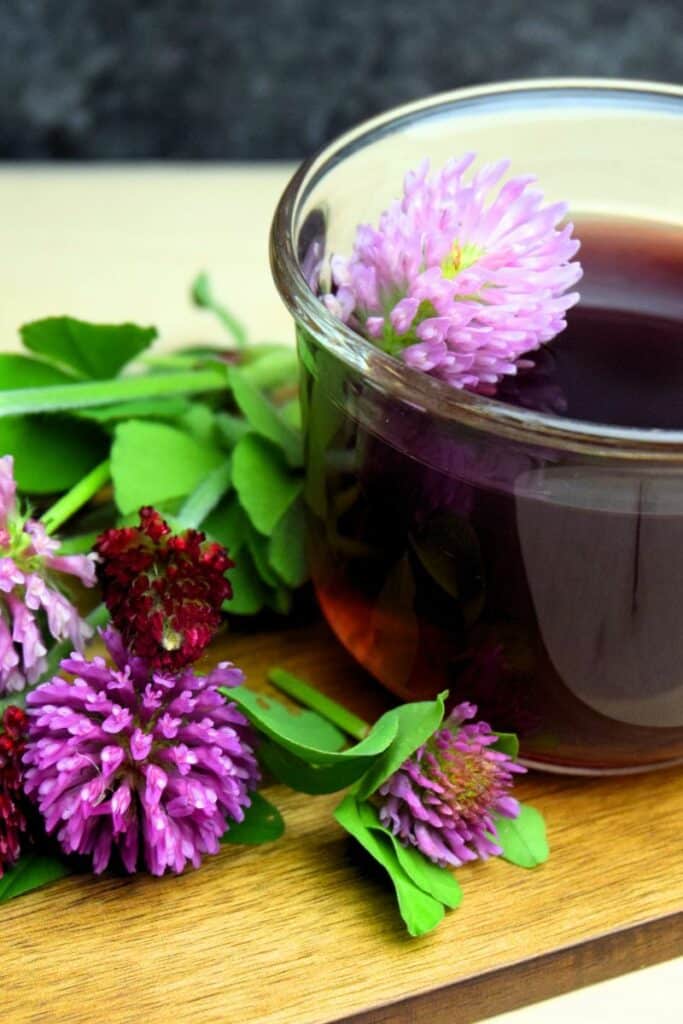
Associated Risks of Red Clover
While Red Clover is generally safe, it's important to be cautious in certain situations:
- Estrogen-sensitive conditions: Red Clover contains compounds that act like estrogen. If you have conditions sensitive to estrogen, like breast cancer or uterine fibroids, check with your doctor before using Red Clover.
- Blood clotting disorders: If you're taking blood-thinning medications, Red Clover might increase bleeding risk. Talk to your doctor if you have a clotting disorder or take blood thinners.
- Pregnancy and breastfeeding: Red Clover's effects on hormones could impact pregnancy or breastfeeding. Stick to small amounts from food like tea, and consult your doctor before using supplements.
- Allergies: Some people may be allergic to Red Clover. Watch for signs like rash or difficulty breathing, and stop using it if you have an allergic reaction.
Always consult with a healthcare provider before using Red Clover, especially if you have health issues or take medications.
2. Green Tea As An Ally Against Hormonal Acne
Green Tea is not just a tasty beverage; it's a potent weapon in your skincare arsenal, particularly when it comes to dealing with hormonal acne. The secret lies in its rich antioxidant content.
Antioxidants are molecules that help protect your skin from damage caused by free radicals, which are unstable molecules that can wreak havoc on your skin cells. By drinking Green Tea regularly, you're flooding your body with these protective compounds, providing a shield against the oxidative stress that can trigger acne breakouts.
But the benefits don't stop there. Scientific research has shown that Green Tea's antioxidants have anti-inflammatory properties, meaning they can help calm redness and swelling associated with acne. Additionally, some studies suggest that Green Tea may help regulate hormone levels, including the hormones implicated in acne development.
In essence, Green Tea offers a multifaceted approach to tackling hormonal acne. It not only addresses inflammation and oxidative stress but also potentially influences hormonal balance, making it a comprehensive solution for clearer, healthier skin.
Sencha green tea has been shown to be the best source of these antioxidants and anti-inflammatory properties.
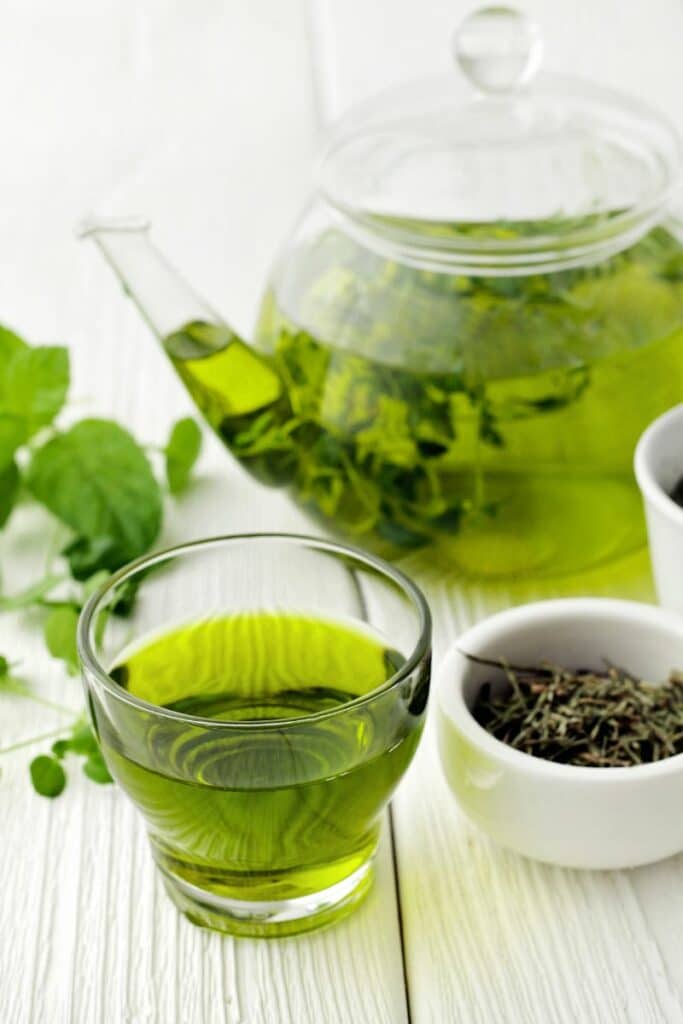
Associated Risks of Green Tea
While Green Tea is generally safe, it's important to be cautious in certain situations:
- Caffeine sensitivity: Green Tea contains caffeine, which can cause jitteriness, insomnia, or heart palpitations in some individuals. If you're sensitive to caffeine, consider opting for decaffeinated Green Tea or limiting your intake.
- Pregnancy and breastfeeding: High amounts of caffeine in Green Tea may pose risks during pregnancy, including low birth weight and miscarriage. Limiting caffeine intake or opting for decaffeinated Green Tea is advisable during pregnancy and breastfeeding.
- Iron absorption: Green Tea contains tannins, which can inhibit the absorption of iron from plant-based sources. If you rely on plant-based sources of iron, consider consuming Green Tea between meals rather than with iron-rich foods to minimize interference with iron absorption.
- Medication interactions: Green Tea may interact with certain medications, including blood thinners, antidepressants, and medications for high blood pressure.
- Allergies: Some individuals may be allergic to Green Tea or experience adverse reactions such as rash or difficulty breathing. Discontinue use and seek medical attention if you experience allergic symptoms.
3. Black Cohosh To Regulate Periods
If you're dealing with irregular menstrual cycles, Black Cohosh could be your new best friend. This herb has been used for centuries to help regulate periods and bring balance to the menstrual cycle.
Black Cohosh contains compounds that mimic the effects of estrogen in the body. Estrogen is a hormone that plays a crucial role in regulating the menstrual cycle. By supplementing with Black Cohosh, you're essentially giving your body a boost of estrogen-like compounds, which can help regulate your cycle and promote more regular periods.
Research supports the use of Black Cohosh for managing menstrual irregularities. Studies have shown that it can help reduce the frequency and severity of irregular periods, making it a promising option for women seeking natural solutions for menstrual health.
So, if you're struggling with irregular periods, consider adding Black Cohosh to your wellness routine. It's a natural and effective way to support hormonal balance and promote a more regular menstrual cycle.
Black Cohosh does have a distinct, so I suggest a capsule form if you don't enjoy wellness herbs like this.
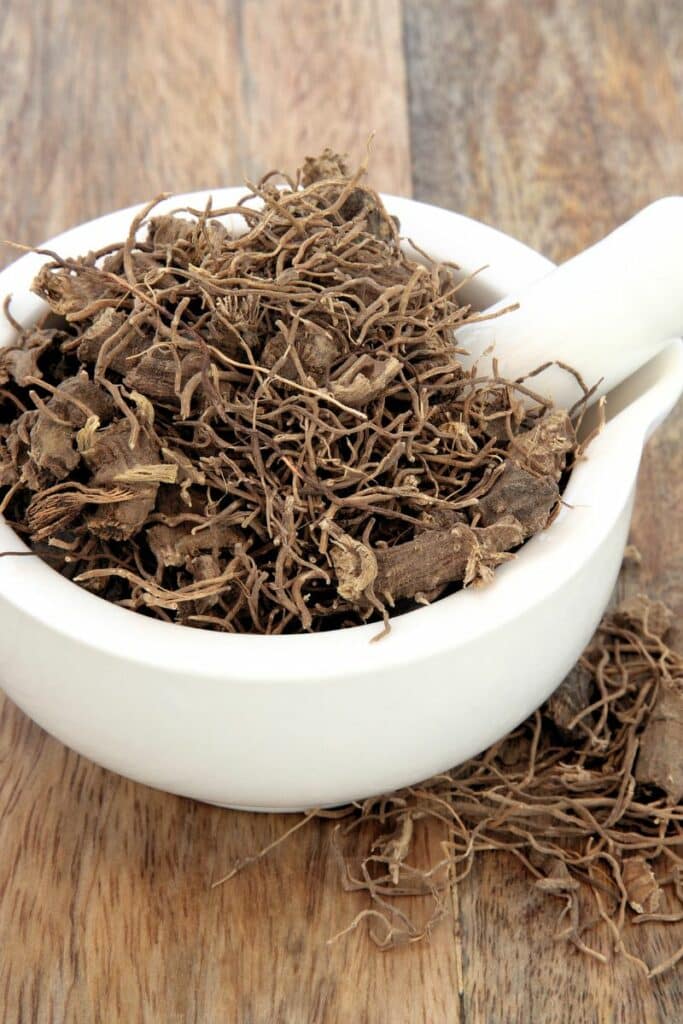
Associated Risks of Black Cohosh
While Black Cohosh is generally safe, it's important to be cautious:
- Liver health: Rarely, Black Cohosh may cause liver damage. If you have liver issues or experience abdominal pain, jaundice, or dark urine while using Black Cohosh, stop and see a doctor.
- Pregnancy and breastfeeding: Avoid Black Cohosh during pregnancy and breastfeeding, as its safety isn't confirmed.
- Estrogen-sensitive conditions: Black Cohosh acts like estrogen. If you have estrogen-sensitive conditions like breast cancer, consult your doctor before using it.
- Medication interactions: Black Cohosh might interact with certain medications. Check with your doctor if you're on medication.
- Allergies: Some people may be allergic to Black Cohosh. Stop using it if you have any allergic reactions.
4. Chaste Berry (Vitex Agnus-Castus): A Natural Fertility Tea
Chaste Berry is often hailed as a natural fertility tea, revered for its ability to support reproductive health. This herb has a long history of traditional use in promoting fertility and regulating menstrual cycles. If you want a high-quality, done-for-you herbal tea for extra fertility support, check this one out.
But what exactly does it do? Chaste Berry works by influencing the balance of reproductive hormones, particularly prolactin and progesterone. By modulating these hormones, it can help regulate menstrual cycles and improve ovulation, thus enhancing fertility.
Scientific studies have provided evidence supporting the benefits of Chaste Berry for fertility. Research suggests that Chaste Berry supplementation may help increase progesterone levels, which are crucial for maintaining a healthy menstrual cycle and supporting early pregnancy.
Additionally, Chaste Berry has been shown to have a positive impact on conditions such as polycystic ovary syndrome (PCOS), which can affect fertility. By helping to regulate hormone levels and promote ovulation, Chaste Berry may offer a natural solution for women struggling with infertility due to PCOS.
In conclusion, Chaste Berry is a valuable ally for those seeking to boost fertility and support reproductive health naturally. Backed by scientific research, it offers a promising option for women on their journey to conception.
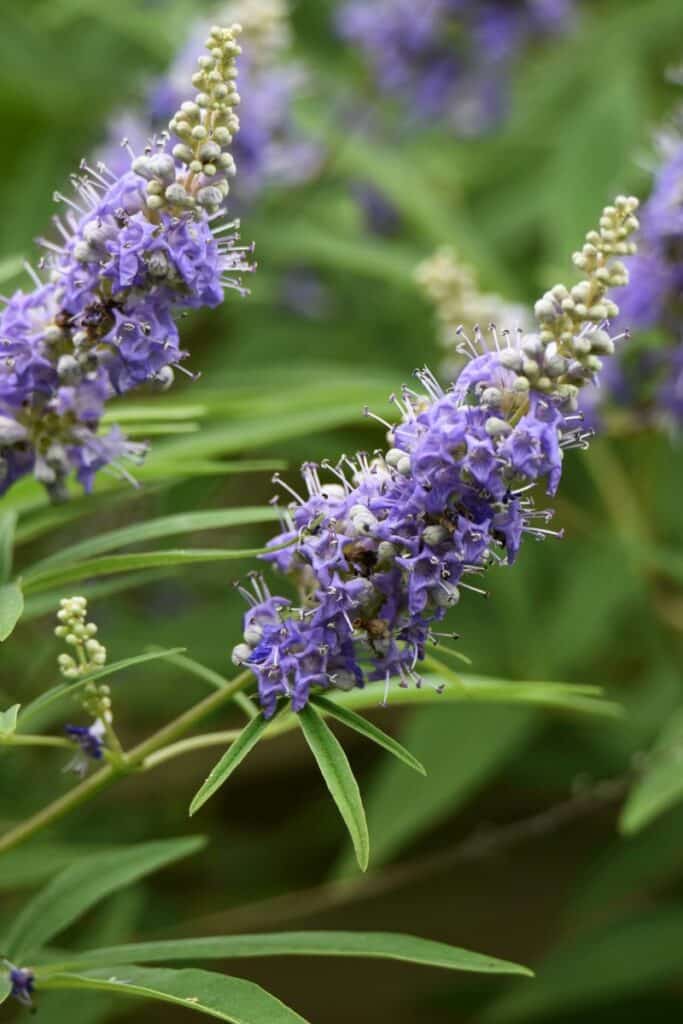
Associated Risks of Chaste Tree (Vitex)
While Chaste Tree, also known as Vitex, is generally safe for most people, it's important to be aware of potential risks:
- Hormonal effects: Chaste Tree works by affecting hormone levels in the body, particularly prolactin and progesterone. If you have hormone-sensitive conditions or are taking hormone medications, consult with your healthcare provider before using Chaste Tree.
- Pregnancy and breastfeeding: Chaste Tree has been traditionally used to regulate menstrual cycles and may affect hormone levels, making its safety during pregnancy and breastfeeding uncertain. It's best to avoid using Chaste Tree during these times unless under the guidance of a healthcare professional.
- Medication interactions: Chaste Tree may interact with certain medications, including hormone therapies and medications for mental health conditions. Consult with your healthcare provider if you're taking medication to ensure Chaste Tree is safe for you.
- Digestive upset: Some individuals may experience gastrointestinal side effects such as nausea, stomach pain, or diarrhea when taking Chaste Tree. If you experience these symptoms, discontinue use and consult with a healthcare provider.
- Allergies: While rare, some people may be allergic to Chaste Tree. If you experience any allergic reactions such as rash, itching, or difficulty breathing, stop using it and seek medical attention.
5. Dong Quai: The Female Ginseng
Dong Quai, also known as "female ginseng," has long been revered for its ability to regulate hormone production and menstrual cycles. This herb is a cornerstone in traditional Chinese medicine for addressing women's health issues.
But how does it work its magic? Dong Quai contains compounds that exert regulatory effects on estrogen and testosterone levels in the body. By modulating these hormones, Dong Quai can help restore balance to the menstrual cycle and alleviate symptoms associated with hormonal imbalances, such as irregular periods or menstrual cramps.
Research suggests that Dong Quai may have estrogenic effects, meaning it can mimic the activity of estrogen in the body. This can be particularly beneficial for women experiencing estrogen deficiency or hormonal fluctuations associated with menopause.
Additionally, Dong Quai has been found to possess anti-androgenic properties, which means it can help lower testosterone levels in the body. This may be advantageous for women with conditions such as polycystic ovary syndrome (PCOS), where elevated testosterone levels can disrupt hormonal balance and lead to symptoms like acne or hirsutism.
In summary, Dong Quai offers a natural and holistic approach to balancing hormones in women. By regulating estrogen and testosterone levels, it can help support menstrual health and alleviate symptoms associated with hormonal imbalances.
Dong Quai in tincture form is usually a great option.

Associated Risks of Dong Quai
While Dong Quai is generally considered safe for most people, it's important to be aware of potential risks:
- Hormonal effects: Dong Quai contains compounds that may affect estrogen levels in the body. If you have hormone-sensitive conditions such as breast cancer or uterine fibroids, consult with your healthcare provider before using Dong Quai.
- Pregnancy and breastfeeding: Dong Quai has been traditionally used to regulate menstrual cycles and may affect hormone levels, making its safety during pregnancy and breastfeeding uncertain. It's best to avoid using Dong Quai during these times unless under the guidance of a healthcare professional.
- Medication interactions: Dong Quai may interact with certain medications, including blood thinners, hormone therapies, and medications for high blood pressure. Consult with your healthcare provider if you're taking medication to ensure Dong Quai is safe for you.
- Skin sensitivity: Some individuals may experience increased sensitivity to sunlight (photosensitivity) when using Dong Quai. Take precautions to protect your skin from sun exposure if you're using Dong Quai.
- Digestive upset: Dong Quai may cause gastrointestinal side effects such as nausea, stomach pain, or diarrhea in some people. If you experience these symptoms, discontinue use and consult with a healthcare provider.
- Allergies: While rare, some people may be allergic to Dong Quai. If you experience any allergic reactions such as rash, itching, or difficulty breathing, stop using it and seek medical attention.
6. Raspberry Leaf Tea To Support Healthy Menstrual Cycles
Raspberry Leaf Tea has long been celebrated for its ability to strengthen the uterus and promote overall menstrual health. This herbal remedy is rich in nutrients and compounds that can work wonders for women's reproductive systems.
One of the key benefits of Raspberry Leaf Tea is its ability to tone and strengthen the uterus. By drinking this tea regularly, women may experience improved uterine muscle tone, which can lead to more regular and less painful menstrual cycles.
Additionally, Raspberry Leaf Tea is particularly beneficial for women who experience heavy periods. The astringent properties of the herb help to reduce excessive bleeding and promote a more balanced menstrual flow. This can be especially helpful for women who suffer from conditions like menorrhagia or uterine fibroids.
Overall, Raspberry Leaf Tea offers a gentle and natural way to support a healthy menstrual cycle. Whether you're looking to strengthen your uterus or alleviate heavy periods, this herbal remedy may just be the solution you've been searching for.
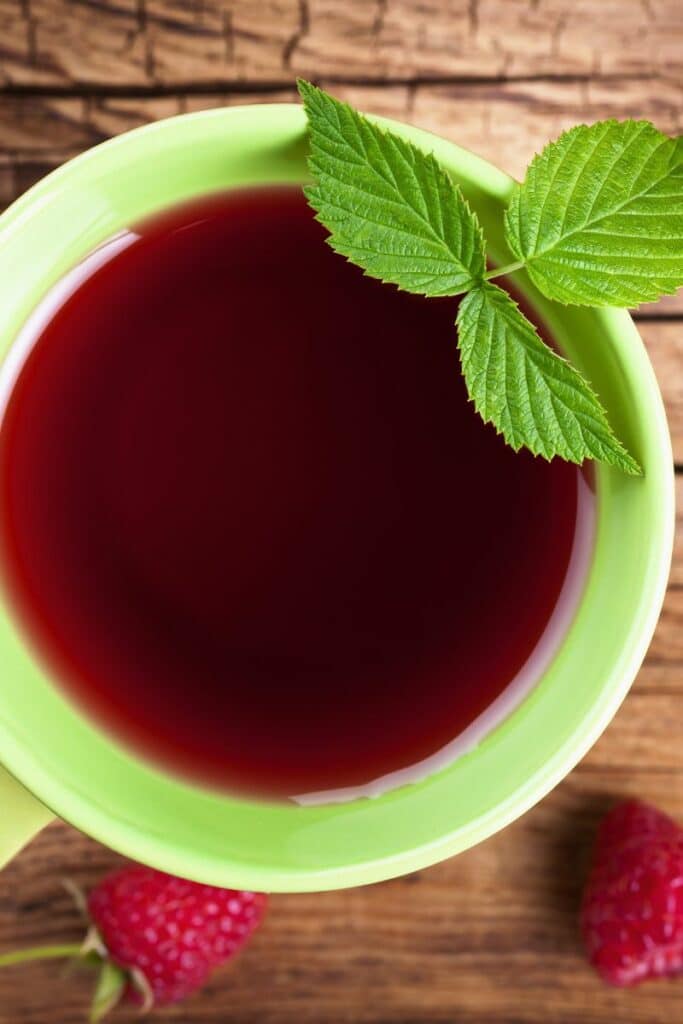
Associated Risks of Red Raspberry Leaf Tea
While Raspberry Leaf Tea is generally safe for most people, it's important to be aware of potential risks:
- Uterine stimulation: Raspberry Leaf Tea has traditionally been used to tone the uterus and may stimulate contractions. While there is limited scientific evidence to support its use during pregnancy, some healthcare providers recommend avoiding Raspberry Leaf Tea in early pregnancy to reduce the risk of uterine contractions.
- Allergic reactions: Some individuals may be allergic to raspberries or other plants in the rose family, and may experience allergic reactions such as rash, itching, or difficulty breathing after consuming Raspberry Leaf Tea. Discontinue use and seek medical attention if you experience any allergic symptoms.
- Digestive upset: Raspberry Leaf Tea may cause gastrointestinal side effects such as nausea, stomach pain, or diarrhea in some people. If you experience these symptoms, discontinue use and consult with a healthcare provider.
- Medication interactions: Raspberry Leaf Tea may interact with certain medications, although interactions are rare. If you're taking medication, consult with your healthcare provider before using Raspberry Leaf Tea to ensure it's safe for you.
7. Lemon Balm for Stress Hormone Management
Lemon Balm is renowned for its ability to reduce stress hormones and promote relaxation, making it a go-to remedy for those seeking calm amidst life's chaos.
But how does it work its magic? Lemon Balm exerts its calming effects by influencing the nervous system, particularly the neurotransmitter GABA (gamma-aminobutyric acid). GABA is responsible for inhibiting nerve transmission in the brain, leading to feelings of relaxation and tranquility.
By enhancing GABA activity, Lemon Balm helps quiet the mind and alleviate stress. Studies have shown that Lemon Balm can reduce levels of cortisol, the primary stress hormone, thereby mitigating the physiological effects of stress on the body.
So, whether you're feeling overwhelmed or simply seeking a moment of serenity, reach for a cup of Lemon Balm tea. Its gentle yet effective calming properties offer a natural way to soothe your mind and restore inner peace.

Associated Risks of Lemon Balm
While Lemon Balm is generally safe for most people, it's important to be aware of potential risks:
- Sedative effects: Lemon Balm may have mild sedative effects and could enhance the effects of medications or other substances that cause drowsiness. Use caution when operating machinery or driving after consuming Lemon Balm, especially in large amounts.
- Thyroid function: Lemon Balm contains compounds that may interfere with thyroid function, particularly in individuals with thyroid disorders. If you have thyroid issues, consult with your healthcare provider before using Lemon Balm.
- Allergic reactions: Some individuals may be allergic to Lemon Balm or other plants in the mint family, and may experience allergic reactions such as rash, itching, or difficulty breathing. Discontinue use and seek medical attention if you experience any allergic symptoms.
- Medication interactions: Lemon Balm may interact with certain medications, including sedatives, thyroid medications, and medications for mental health conditions. Consult with your healthcare provider if you're taking medication to ensure Lemon Balm is safe for you.
- Skin sensitivity: In rare cases, topical application of Lemon Balm may cause skin irritation or photosensitivity (increased sensitivity to sunlight). Perform a patch test before applying Lemon Balm topically, and use sunscreen if you're using it on exposed skin.
8. White Peony: Hormone-Balancing Ayurvedic Herb
White Peony (Paeonia lactiflora) offers a holistic approach to hormone balance, drawing from the ancient wisdom of Ayurveda. This herb is prized for its ability to harmonize hormonal fluctuations and support overall well-being in women.
So, how does White Peony work its magic? In Ayurvedic tradition, it is believed that White Peony acts as a tonic for the female reproductive system, helping to regulate menstrual cycles and alleviate symptoms associated with hormonal imbalances.
Research suggests that White Peony may exert its hormone-balancing effects by modulating levels of certain hormones, such as estrogen and progesterone. By promoting hormonal harmony, White Peony can help alleviate symptoms like menstrual irregularities, PMS, and menopausal discomfort.
In addition to its hormone-balancing properties, White Peony is also revered for its anti-inflammatory and antioxidant properties, which further support women's health and well-being.
In essence, White Peony offers a natural and holistic approach to hormone balance, rooted in the principles of Ayurveda.

Associated Risks of White Peony
While White Peony is generally safe for most people, it's important to be aware of potential risks:
- Hormonal effects: White Peony may affect hormone levels in the body, particularly estrogen. If you have hormone-sensitive conditions such as breast cancer or uterine fibroids, consult with your healthcare provider before using White Peony.
- Pregnancy and breastfeeding: While there is limited information on the safety of White Peony during pregnancy and breastfeeding, it's best to avoid using it unless under the guidance of a healthcare professional.
- Medication interactions: White Peony may interact with certain medications, including hormone therapies and medications for high blood pressure. Consult with your healthcare provider if you're taking medication to ensure White Peony is safe for you.
- Allergic reactions: Some individuals may be allergic to White Peony or other plants in the Paeoniaceae family, and may experience allergic reactions such as rash, itching, or difficulty breathing. Discontinue use and seek medical attention if you experience any allergic symptoms.
- Digestive upset: White Peony may cause gastrointestinal side effects such as nausea, stomach pain, or diarrhea in some people. If you experience these symptoms, discontinue use and consult with a healthcare provider.
9. Dandelion Root: Detoxifying for Hormonal Health
Dandelion Root can play a role in detoxifying for hormonal health. It's not just a pesky weed; it's a powerful herbal remedy that can help cleanse the body and support hormone balance. This humble root has long been used in traditional medicine for its detoxifying properties.
Dandelion Root contains compounds that stimulate the liver, our body's primary detoxification organ. By enhancing liver function, Dandelion Root helps the body efficiently remove toxins and waste products, which can otherwise disrupt hormone balance.
Additionally, Dandelion Root is rich in antioxidants, which play a crucial role in combating free radicals. Free radicals are unstable molecules that can damage cells and contribute to hormonal imbalances. By scavenging these harmful molecules, Dandelion Root helps protect the body from oxidative stress and supports overall hormonal health.

Associated Risks of Dandelion Root
While Dandelion Root is generally safe for most people, it's important to be aware of potential risks:
- Allergic reactions: Some individuals may be allergic to dandelion or other plants in the Asteraceae family, and may experience allergic reactions such as rash, itching, or difficulty breathing after consuming dandelion root. Discontinue use and seek medical attention if you experience any allergic symptoms.
- Digestive upset: Dandelion root may cause gastrointestinal side effects such as stomach upset, diarrhea, or heartburn in some people, particularly when consumed in high amounts. If you experience these symptoms, reduce your intake of dandelion root or discontinue use.
- Interactions with medications: Dandelion root may interact with certain medications, including blood thinners, diuretics, and medications for diabetes. Consult with your healthcare provider if you're taking medication to ensure dandelion root is safe for you.
- Gallbladder issues: Dandelion root may increase bile production and flow, which could worsen symptoms in individuals with gallbladder problems or gallstones. If you have gallbladder issues, consult with your healthcare provider before using dandelion root.
- Pregnancy and breastfeeding: While dandelion root is generally considered safe during pregnancy and breastfeeding when consumed in moderation as part of the diet, it's always best to consult with your healthcare provider before using any herbal remedies during these times.
10. Fennel Seeds To Relieve PMS Symptoms
Fennel Seeds are not just flavorful spices; they're also potent allies in easing premenstrual syndrome (PMS) symptoms. These tiny seeds have been used for centuries in traditional medicine for their medicinal properties.
Fennel Seeds contain compounds that help regulate hormonal fluctuations, which can alleviate symptoms like bloating, cramps, and mood swings commonly associated with PMS.
But that's not all – Fennel Seeds also play a role in promoting better digestion. They have carminative properties, meaning they can help ease digestive discomfort by reducing gas, bloating, and indigestion. Additionally, Fennel Seeds contain fiber, which supports regular bowel movements and overall digestive health.
In essence, Fennel Seeds offer a natural and holistic approach to relieving PMS symptoms and promoting digestive wellness. Whether you're seeking relief from menstrual discomfort or looking to support your digestive system, incorporating Fennel Seeds into your diet can provide a soothing solution.
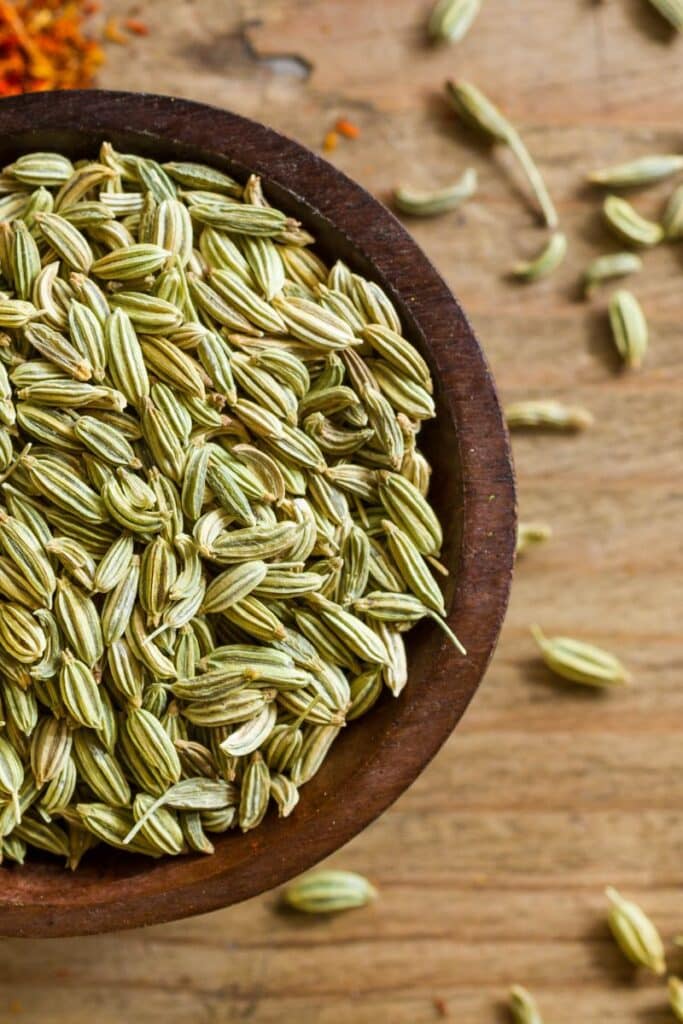
Associated Risks of Fennel Seeds
While Fennel Seeds are generally safe for most people, it's important to be aware of potential risks:
- Allergic reactions: Some individuals may be allergic to fennel or other plants in the Apiaceae family, and may experience allergic reactions such as rash, itching, or difficulty breathing after consuming fennel seeds. Discontinue use and seek medical attention if you experience any allergic symptoms.
- Pregnancy and breastfeeding: Fennel seeds have been traditionally used to promote lactation and may have estrogenic effects, which could affect hormone levels during pregnancy and breastfeeding. While small amounts of fennel seeds consumed as part of the diet are generally considered safe, it's best to avoid concentrated fennel supplements during these times unless under the guidance of a healthcare professional.
- Medication interactions: Fennel seeds may interact with certain medications, including blood thinners, medications for high blood pressure, and medications metabolized by the liver. Consult with your healthcare provider if you're taking medication to ensure fennel seeds are safe for you.
- Gastrointestinal issues: Fennel seeds may cause gastrointestinal side effects such as stomach upset, gas, or bloating in some people, particularly when consumed in large amounts or as a supplement. If you experience these symptoms, reduce your intake of fennel seeds or discontinue use.
- Photosensitivity: In rare cases, topical application of fennel oil or prolonged exposure to fennel seeds may increase sensitivity to sunlight, leading to skin irritation or sunburn. Use caution and avoid excessive sun exposure when using fennel products topically.
11. St. John's Wort To Battle Mood Swings
St. John's Wort isn't just a pretty flower; it's also a potent herbal remedy for managing mood swings and emotional fluctuations. This herb has a long history of use in traditional medicine for its mood-enhancing properties.
So, how does St. John's Wort work its magic? Well, it's believed to exert its effects by influencing serotonin levels in the brain. Serotonin is a neurotransmitter that plays a key role in regulating mood, and imbalances in serotonin levels have been linked to mood disorders like depression and anxiety.
Research suggests that St. John's Wort may help increase serotonin levels in the brain, thereby improving mood and reducing symptoms of mood swings. By modulating serotonin activity, St. John's Wort offers a natural and holistic approach to managing emotional fluctuations.
In essence, St. John's Wort offers a ray of hope for those struggling with mood swings. By harnessing its mood-enhancing properties, you can find relief from emotional ups and downs and embrace a more stable and balanced state of mind.
It's tough to find high-quality, fresh st. john's wort. For this reason, I suggest using capsules or a tincture.
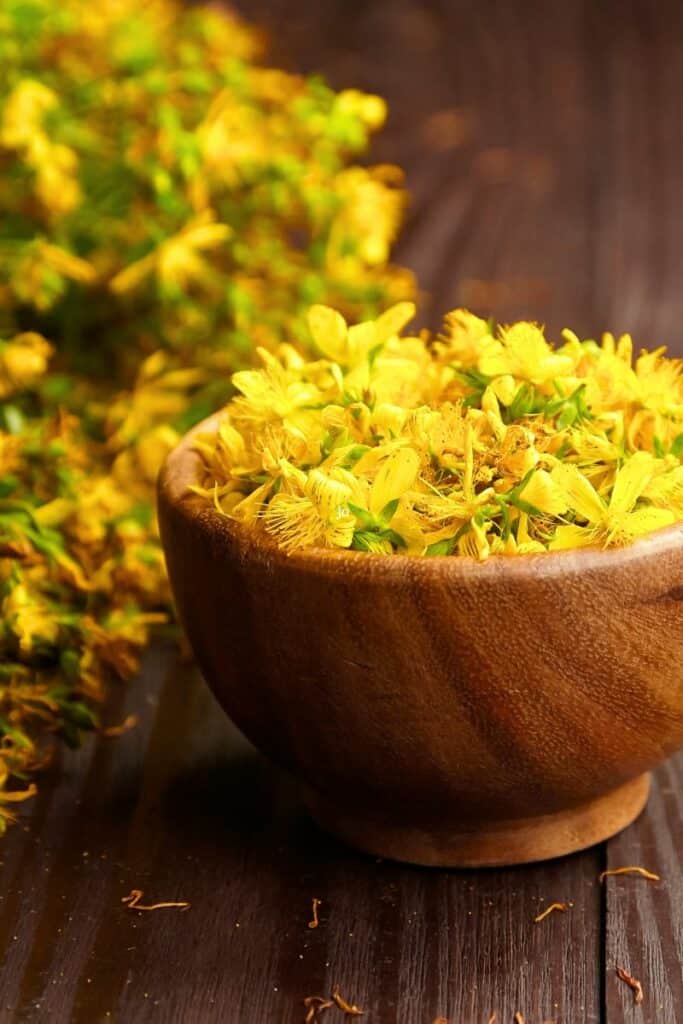
Associated Risks of St. John's Wort
While St. John's Wort is generally considered safe for most people, it's important to be aware of potential risks:
- Medication interactions: St. John's Wort may interact with a wide range of medications, including antidepressants, birth control pills, blood thinners, and medications for HIV/AIDS, among others. These interactions can reduce the effectiveness of medications or lead to potentially serious side effects. Always consult with your healthcare provider before using St. John's Wort if you're taking any medications.
- Photosensitivity: St. John's Wort may increase sensitivity to sunlight in some individuals, leading to a higher risk of sunburn or skin irritation. Use sunscreen and protective clothing when exposed to sunlight, especially during prolonged outdoor activities.
- Gastrointestinal upset: Some individuals may experience gastrointestinal side effects such as stomach upset, nausea, or diarrhea when taking St. John's Wort. If you experience these symptoms, reduce your dosage or discontinue use.
- Allergic reactions: While rare, some individuals may be allergic to St. John's Wort and may experience allergic reactions such as rash, itching, or difficulty breathing. Discontinue use and seek medical attention if you experience any allergic symptoms.
- Mental health conditions: St. John's Wort is commonly used to treat mild to moderate depression, but its safety and effectiveness for this purpose can vary from person to person. If you're considering using St. John's Wort for depression or other mental health conditions, consult with a healthcare professional for guidance and monitoring.
- Pregnancy and breastfeeding: The safety of St. John's Wort during pregnancy and breastfeeding is uncertain, and its use is not recommended during these times due to potential risks to the developing fetus or nursing infant.
12. Milk Thistle To Support the Liver
Let's explore how Milk Thistle can be a powerhouse in supporting liver health. This herb has been revered for centuries for its remarkable ability to promote liver health.
Milk Thistle contains a compound called silymarin, which is believed to be responsible for many of its beneficial effects. Silymarin acts as a potent antioxidant, helping to protect liver cells from damage caused by toxins and free radicals.
Additionally, Milk Thistle supports detoxification processes in the liver. It stimulates the production of bile, a substance that helps the body eliminate toxins and waste products. By enhancing detoxification, Milk Thistle helps support overall liver function and hormone metabolism.
So, whether you're looking to support your liver health or enhance hormone metabolism, Milk Thistle offers a natural and effective solution.
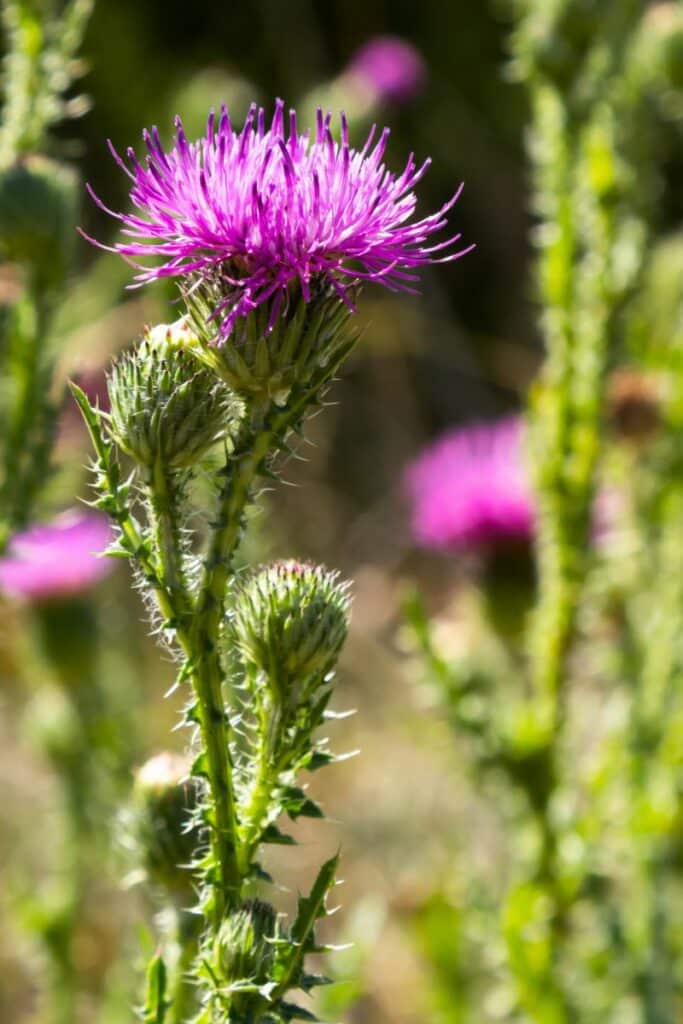
Associated Risks of Milk Thistle
While Milk Thistle is generally considered safe for most people, it's important to be aware of potential risks:
- Allergic reactions: Some individuals may be allergic to milk thistle or other plants in the Asteraceae family, and may experience allergic reactions such as rash, itching, or difficulty breathing after consuming milk thistle. Discontinue use and seek medical attention if you experience any allergic symptoms.
- Digestive upset: Milk thistle may cause gastrointestinal side effects such as stomach upset, diarrhea, or bloating in some people, particularly when consumed in high amounts or as a supplement. If you experience these symptoms, reduce your intake of milk thistle or discontinue use.
- Medication interactions: Milk thistle may interact with certain medications, including blood thinners, medications for diabetes, and certain cancer medications. Consult with your healthcare provider if you're taking medication to ensure milk thistle is safe for you.
- Hormonal effects: Milk thistle contains compounds that may have estrogenic effects, which could affect hormone levels in the body. If you have hormone-sensitive conditions such as breast cancer or uterine fibroids, consult with your healthcare provider before using milk thistle.
5 Warming Spices for Better Blood Flow
Herbs aren't the only herbal medicine here. 5 specific spices can be powerful remedies when overcoming hormonal imbalance. Let's discuss the benefits of each warming spice for blood flow and its connection to hormone health:
1. Clove
Clove is rich in eugenol, a compound known for its anti-inflammatory properties. By reducing inflammation, clove can help relax blood vessels and improve blood flow. Better blood circulation means improved delivery of oxygen and nutrients to cells throughout the body, including hormone-producing glands like the adrenal and thyroid glands. This enhanced circulation can support hormone health by ensuring proper signaling and function of these glands.
2. Ginger
Ginger contains gingerol, a bioactive compound with vasodilatory effects, meaning it can widen blood vessels and improve blood flow. This increased circulation can benefit hormone health by supporting the transport of hormones throughout the body and enhancing communication between hormone-producing organs like the ovaries and pituitary gland.
3. Cinnamon
Cinnamon is packed with antioxidants and has been shown to improve blood flow by reducing inflammation and relaxing blood vessels. Improved circulation can aid hormone health by ensuring efficient delivery of hormones to target tissues and organs. Additionally, cinnamon may help regulate blood sugar levels, which can indirectly impact hormone balance, particularly insulin levels.
4. Cayenne
Cayenne contains capsaicin, a compound known for its vasodilatory properties. By dilating blood vessels, cayenne can enhance blood flow and circulation. This improved circulation can benefit hormone health by supporting the transport of hormones throughout the body and optimizing communication between hormone-producing glands like the adrenal glands and the hypothalamus.
5. Turmeric
Turmeric's active compound, curcumin, possesses anti-inflammatory and antioxidant properties that can improve blood flow by reducing inflammation and preventing oxidative damage to blood vessels. Enhanced circulation can support hormone health by ensuring proper delivery of hormones to target tissues and organs. Additionally, turmeric may help regulate blood sugar levels, which can indirectly influence hormone balance, particularly insulin sensitivity.
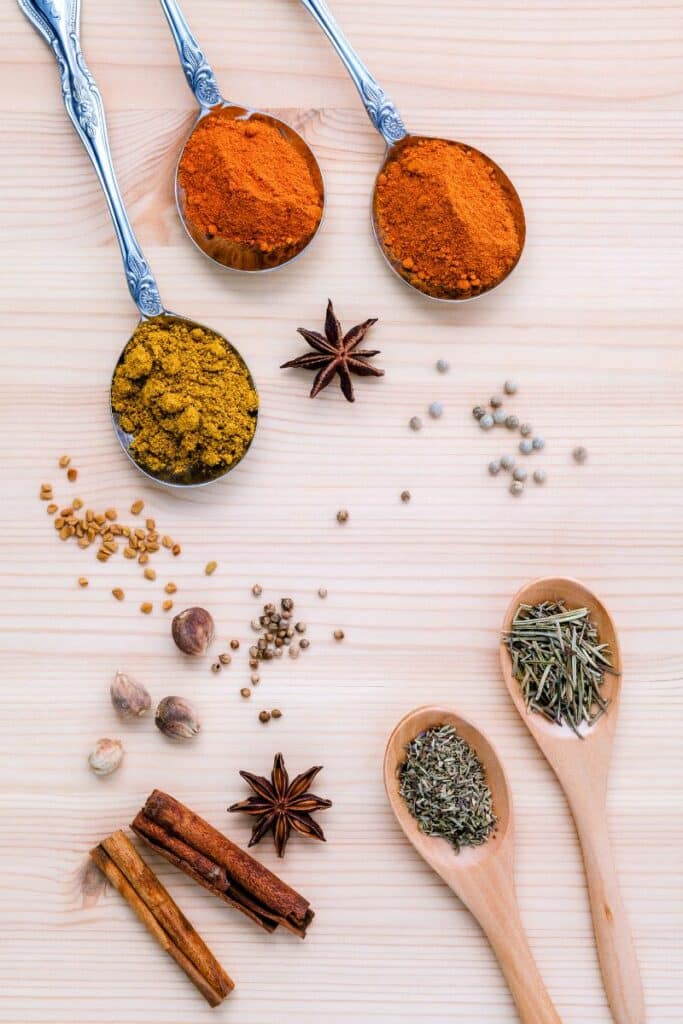
Incorporating these warming spices into your diet can not only spice up your meals but also promote better blood flow, which is crucial for hormone health and overall well-being.
An easy way to incorporate all 5 spices is to create a spice mix using about 1 teaspoon to 1 tablespoon of each. Play around with the ratios based on what you like most. Then, incorporate it into meals or mix into some warm water to enjoy with lemon in the morning!
Associated Risks of These 5 Spices
While these spices are generally safe when consumed in moderate amounts as part of a balanced diet, there are some potential risks to consider:
- Digestive Issues: Some individuals may experience gastrointestinal discomfort, such as heartburn or stomach upset, when consuming large amounts of spicy spices like cayenne pepper or ginger.
- Blood Thinning: Cayenne pepper contains capsaicin, which may have blood-thinning properties. If you're taking blood-thinning medications or have a bleeding disorder, consuming large amounts of cayenne pepper may increase the risk of bleeding.
- Allergic Reactions: While rare, some individuals may be allergic to certain spices, particularly cloves. Allergic reactions can manifest as skin rashes, itching, swelling, or difficulty breathing. If you have known allergies to any of these spices, avoid consuming them or use caution when introducing them into your diet.
- Interaction with Medications: Some spices, such as turmeric and ginger, may interact with certain medications. For example, turmeric may interfere with blood-thinning medications and ginger may interact with blood pressure medications. If you're taking medication, consult with your healthcare provider before significantly increasing your intake of these spices.
- Pregnancy and Breastfeeding: While these spices are generally considered safe in culinary amounts during pregnancy and breastfeeding, it's essential to consume them in moderation. Some spices, such as cinnamon, may have uterine-stimulating effects and should be consumed in moderation during pregnancy.
- Gastrointestinal Issues: In some cases, consuming large amounts of spices like ginger or cayenne pepper may exacerbate gastrointestinal conditions such as acid reflux or irritable bowel syndrome (IBS). If you have a sensitive stomach or digestive issues, it's best to consume these spices in moderation and monitor your symptoms.
Overall, while these spices offer numerous health benefits, it's essential to consume them in moderation and be mindful of any potential interactions or sensitivities. If you have any concerns or underlying health conditions, consult with a healthcare provider or registered dietitian before significantly increasing your intake of these spices.
Conclusion
Herbal teas are a wonderful and natural way to help balance hormones, boost overall health, and tackle various women's health issues. There are many options to choose from, such as red clover for menopause symptoms, chaste berry for reproductive health, and lemon balm for stress management. However, it's important to talk to your doctor before trying herbal teas, especially if you have health concerns or are pregnant.
Sip on a soothing cup of herbal tea and enjoy the gentle support it offers for your well-being and hormone health.
